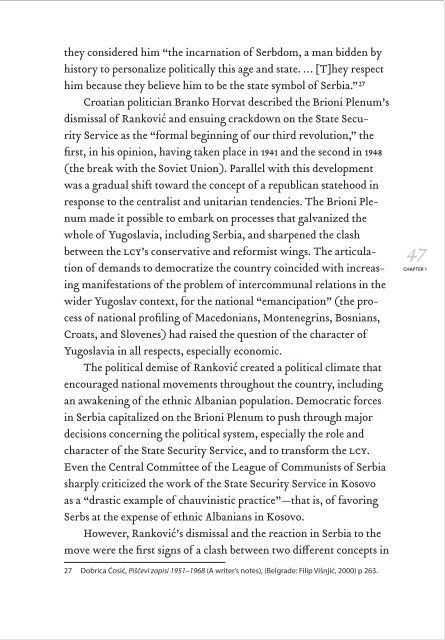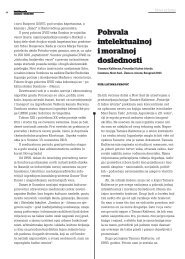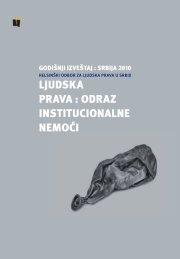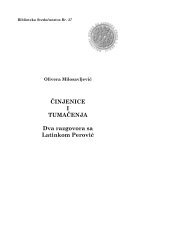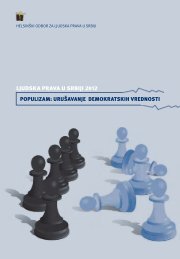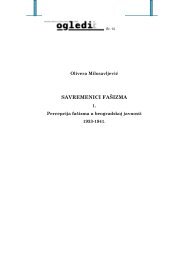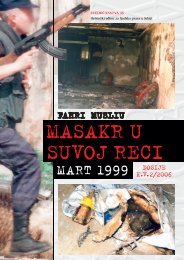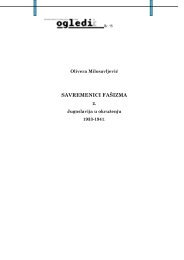- Page 1: SONJA BISERKO Yugoslavia’s Implos
- Page 4 and 5: Yugoslavia’s Implosion by Sonja B
- Page 7: To my brother Željko Biserko
- Page 10 and 11: 10 Foreword time, émigré literatu
- Page 12 and 13: II 12 Foreword Biserko’s argument
- Page 14 and 15: in World War Two came to just over
- Page 16 and 17: 16 Introduction researched. Post-co
- Page 18 and 19: 18 Introduction perceived as Serbia
- Page 20 and 21: Milosavljević, Olga Popović-Obrad
- Page 22 and 23: 22 Introduction systemic reform, fo
- Page 24 and 25: 24 Introduction occupy a prominent,
- Page 26 and 27: 26 Introduction unwillingness to pa
- Page 28 and 29: 28 Introduction taken subsequently.
- Page 30 and 31: 30 Introduction short-term and hast
- Page 33 and 34: CHAPTER 1 Serbian Nationalism and t
- Page 35 and 36: The Serbian national program faced
- Page 37 and 38: territory roughly coinciding with t
- Page 39 and 40: Unlike Croats, the Serbs had a “h
- Page 41 and 42: Chetnik 16 and Ustasha 17 movements
- Page 43 and 44: and its leader, Josip Broz Tito, wi
- Page 45: framework for the massive mobilizat
- Page 49 and 50: At the same time, a massive politic
- Page 51 and 52: economic advancement. Being profoun
- Page 53 and 54: historian: “In 1972 in Serbia, an
- Page 55 and 56: The party organization is constantl
- Page 57 and 58: was arbitrary and untenable, and he
- Page 59 and 60: all, those having to do with the ma
- Page 61 and 62: The Serbs’ view of the 1974 Const
- Page 63 and 64: president, Ćosić brought together
- Page 65 and 66: economically, or communicationally.
- Page 67 and 68: the first ethnic Albanian demonstra
- Page 69 and 70: and somewhat inert manner. Immediat
- Page 71 and 72: freedom—which united intellectual
- Page 73 and 74: during the 1999 air war by the Nort
- Page 75 and 76: the establishment of diplomatic rel
- Page 77 and 78: ought to be “defined on the basis
- Page 79 and 80: and the republics. His book System
- Page 81 and 82: elevance. The economist Kosta Mihaj
- Page 83 and 84: liberation and unification of the e
- Page 85 and 86: campaign in late 1991 and early 199
- Page 87 and 88: THE RISE OF MILOŠEVIĆ The prewar
- Page 89 and 90: Tito, who by his visionary inspirat
- Page 91 and 92: aimed at setting the scene for the
- Page 93 and 94: The popularity Milošević enjoyed
- Page 95 and 96: Union. At the same time, it was equ
- Page 97 and 98:
opinion, could save Yugoslavia. Bra
- Page 99 and 100:
war against all neighbors and commi
- Page 101 and 102:
Prince Lazar were part of the run-u
- Page 103 and 104:
Mindful of the changes in the inter
- Page 105 and 106:
Milošević continued to wage a cam
- Page 107 and 108:
objectives, especially following ev
- Page 109 and 110:
leading to its virtual isolation -
- Page 111 and 112:
Dimitrije Ljotić and his Rally Par
- Page 113 and 114:
Because redrawing borders, especial
- Page 115 and 116:
Serbs must constitute a sound basis
- Page 117 and 118:
the unification of all Serbs. The S
- Page 119 and 120:
Milošević was satisfied with the
- Page 121 and 122:
ecause “nothing … stands in the
- Page 123:
ideologues resigned themselves to t
- Page 126 and 127:
decentralization of the Yugoslav st
- Page 128 and 129:
128 Chapter 2 the nvo was entrusted
- Page 130 and 131:
130 Chapter 2 and attempted reversa
- Page 132 and 133:
132 Chapter 2 increasingly succumbe
- Page 134 and 135:
134 Chapter 2 would have meant the
- Page 136 and 137:
136 Chapter 2 Federal Republic of Y
- Page 138 and 139:
138 Chapter 2 within the unitary st
- Page 140 and 141:
140 Chapter 2 the Serbian krajinas
- Page 142 and 143:
142 Chapter 2 The Army’s politica
- Page 144 and 145:
144 Chapter 2 MILOŠEVIĆ AND THE A
- Page 146 and 147:
146 Chapter 2 ploy [by the West] be
- Page 148 and 149:
eakthrough and saw radical social t
- Page 150 and 151:
150 Chapter 2 “the generals’ pa
- Page 152 and 153:
152 Chapter 2 The ypa disliked the
- Page 154 and 155:
154 Chapter 2 defense in accordance
- Page 156 and 157:
156 Chapter 2 said Yugoslavia shoul
- Page 158 and 159:
158 Chapter 2 units, and institutio
- Page 160 and 161:
160 Chapter 2 carried threats to
- Page 162 and 163:
Although as late as 1991 some parts
- Page 164 and 165:
the Serbs and in those regions of p
- Page 166 and 167:
166 Chapter 2 eliminated in a “mo
- Page 168 and 169:
168 Chapter 2 Operational Plans for
- Page 170 and 171:
around Zagreb, Knin, Banja Luka, an
- Page 172 and 173:
172 Chapter 2 Željko Ražnatović
- Page 174 and 175:
174 Chapter 2 In that way the un pe
- Page 176 and 177:
176 Chapter 2 Volunteers from the r
- Page 178 and 179:
Bubanj Potok outside Belgrade. The
- Page 180 and 181:
ypa is in effect already a Serb arm
- Page 182 and 183:
182 Chapter 2 In October 1991, mp s
- Page 184 and 185:
184 Chapter 2 pure Serbian territor
- Page 186 and 187:
186 Chapter 2 police and the parami
- Page 188 and 189:
188 Chapter 2 lifting of un sanctio
- Page 190 and 191:
190 Chapter 2 an opportunity for it
- Page 192 and 193:
192 Chapter 2 the irrational use of
- Page 194 and 195:
possibility of using St. Vitus’ D
- Page 196 and 197:
196 Chapter 3 Albanians have been t
- Page 198 and 199:
The answer to such questions was th
- Page 200 and 201:
200 Chapter 3 launched a drive impo
- Page 202 and 203:
202 Chapter 3 Ivo Andrić, assistan
- Page 204 and 205:
204 Chapter 3 conference issued a r
- Page 206 and 207:
206 Chapter 3 for separate national
- Page 208 and 209:
208 Chapter 3 Autonomous Provinces
- Page 210 and 211:
210 Chapter 3 for such shameful beh
- Page 212 and 213:
212 Chapter 3 inter-nationality rel
- Page 214 and 215:
214 Chapter 3 protest against the s
- Page 216 and 217:
216 Chapter 3 the “belief in demo
- Page 218 and 219:
218 Chapter 3 Radicals and Arkan’
- Page 220 and 221:
220 Chapter 3 was prepared to inter
- Page 222 and 223:
222 Chapter 3 less nationalistic th
- Page 224 and 225:
James Rubin, spokesperson for the S
- Page 226 and 227:
226 Chapter 3 province in the 1990s
- Page 228 and 229:
228 Chapter 3 that Kosovo was of gr
- Page 230 and 231:
230 Chapter 3 Macedonia and Kosovo
- Page 232 and 233:
on the agendas of the un Security C
- Page 234 and 235:
234 Chapter 3 territorial integrity
- Page 236 and 237:
236 Chapter 3 humanitarian organiza
- Page 238 and 239:
238 Chapter 3 repression of the civ
- Page 240 and 241:
240 Chapter 3 as well as effective
- Page 242 and 243:
242 Chapter 3 In view of this prono
- Page 244 and 245:
244 Chapter 3 and that nato would s
- Page 246 and 247:
246 Chapter 3 Albanians because it
- Page 248 and 249:
248 Chapter 3 Russian solidarity wi
- Page 250 and 251:
and the public infrastructure. The
- Page 252 and 253:
252 Chapter 3 elections. His Democr
- Page 254 and 255:
254 Chapter 3 Albanians, who confir
- Page 256 and 257:
Thus, the Serbian nationalists, par
- Page 258 and 259:
258 Chapter 3 Balkan peninsula unti
- Page 260 and 261:
260 Chapter 3 fry but within an int
- Page 262 and 263:
262 Chapter 3 Kosovo would need to
- Page 264 and 265:
264 Chapter 3 haven or protection z
- Page 266 and 267:
266 Chapter 3 Belgrade offered no o
- Page 268 and 269:
268 Chapter 3 Belgrade’s reaction
- Page 270 and 271:
270 Chapter 3 the situation on the
- Page 272 and 273:
272 Chapter 3 (saa)—an agreement
- Page 275 and 276:
CHAPTER 4 Serbia: Between Europe an
- Page 277 and 278:
DEFEAT OF THE TERRITORIAL PRETENSIO
- Page 279 and 280:
social advancement. And it was prec
- Page 281 and 282:
or abroad, these groups are able to
- Page 283 and 284:
The wars in Croatia, Bosnia-Herzego
- Page 285 and 286:
orders. In retrospect, however, the
- Page 287 and 288:
ethnic cleansing, one must bear in
- Page 289 and 290:
Milošević tried to return Yugosla
- Page 291 and 292:
equipment. The military industry co
- Page 293 and 294:
PLUS ÇA CHANGE, PLUS C’EST LA ME
- Page 295 and 296:
The political and economic system t
- Page 297 and 298:
with the Hague Tribunal. The restor
- Page 299 and 300:
would be better to “suck Serbia i
- Page 301 and 302:
Glorification of war and its protag
- Page 303 and 304:
ent on destroying Serbian sacred an
- Page 305 and 306:
icj held that the Genocide Conventi
- Page 307 and 308:
and a historic figure. At the same
- Page 309 and 310:
A DEEP-ROOTED RESISTANCE TO MODERNI
- Page 311 and 312:
structures. Because Serbia rejects
- Page 313:
forward-looking government that Ser
- Page 316 and 317:
Greater Serbia, and to embrace mode
- Page 318 and 319:
318 Chapter 5 Serbia—which had be
- Page 320 and 321:
320 Chapter 5 the discrepancy betwe
- Page 322 and 323:
322 Chapter 5 multiethnic communiti
- Page 324 and 325:
324 Chapter 5 rights, national and
- Page 326 and 327:
326 Chapter 5 legal standards. Ther
- Page 328 and 329:
328 Chapter 5 International Court o
- Page 330 and 331:
efore, has engineered a mass scepti
- Page 333 and 334:
Bibliography The bibliography focus
- Page 335 and 336:
Hodge, Carole, Britain and Balkans:
- Page 337 and 338:
Name Index Abazović, Mirsad 40 Abr
- Page 339 and 340:
Đinđić, Zoran 16, 19, 28, 69, 19
- Page 341 and 342:
Malcolm, Noel 195 Maliqi, Shkëlzen
- Page 343 and 344:
Radinović, Radovan 188 Radosavljev
- Page 345:
“Serbs cannot live peacefully in


